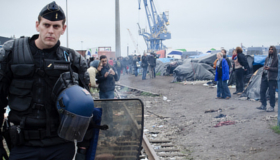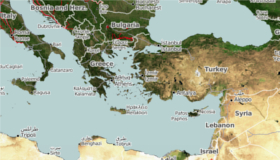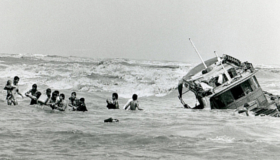Climate change and the conflict in Syria
Why can no one agree about the links between climate change and the Syrian conflict?
Read and watch next…
Video – climate change and armed conflict – how are they linked?
This video looks at the connections between changes in the climate and altered patterns of armed conflict. How are they linked, and will life on hotter planet mean more violence and chaos?
More on Syria and climate change
Syria and climate change: did the media get it right?
In 2015 the media exploded with stories about the link between climate change and the violence in Syria. But did they get it right? This digital report argues that while there are important links between climate change and the Syrian situation, the media has got it...
Video / presentation: climate change and the refugee crisis
The unfolding refugee crisis in Europe and the Middle East has left many people asking whether the situation is related to climate change. Several media reports have drawn connections between climate change and the onset of conflict in Syria. Alex Randall is the...
Briefing Q&A: climate change and the refugee crisis
Watch a video version of this briefing The unfolding refugee crisis in Europe and the Middle East has left many people asking whether the situation is related to climate change. Several media reports have drawn connections between climate change and the current...
Climate change and terrorism: understanding the political narrative
Several prominent commentators have drawn connections between climate change and the rise of ISIS. US Democrat hopeful Martin O’Malley claimed that climate change has lead to the “extreme poverty that has led now to the rise of ISIL and this extreme violence”. John...
Climate change and the Calais refugee “crisis”. Is there a climate connection?
Are any of the refugees attempting to cross the channel from France to the UK fleeing climate change? The short answer is probably not. But the New Scientist ran an Op Ed arguing that the “chaos” in Calais is “a taste of what a warmer world may bring”. The piece...
Climate change and the tragedy in the Mediterranean – are there connections?
This article was first published in Responding to Climate Change. Why are so many people drowning in the Mediterranean? The short answer is this: we cancelled the search and rescue operation. Worse, we decided to cancel it because we knew it would make the crossing...







This is a great intro to the research discussed in this video. You can the find the links to the various original research papers within this article. https://theconversation.com/is-syria-really-a-climate-war-we-examined-the-links-between-drought-migration-and-conflict-80110
Hi Alex,
We just came across your video and we’re happy to see that you read our Conversation piece. We were unsure if you were really referring to our article when listening to the beginning of your video, as you say that the conclusion we reach is that there was “not any real link between the climate change impacts and the start of the Syrian uprising”. We felt it necessary to clarify with you that this is not what we are saying in the article. Our article examines the “evidence” that has been put forward by both media and other researchers and what we find is that it is too weak to say that the link between the drought, migration, and the Syrian conflict is an established fact. The quote below from our article illustrates this:
“What this sequence of events highlights is that the conflict is a culmination of several interconnected factors that had been steadily developing over decades. While drought, migration and conflict may all be linked by association, such links are not established facts and, in the case of Syria, they are difficult to gauge.”
In your discussion you mention that drought drove people from the Syrian countryside into cities. We find this assertion to be highly problematic, and is something that we question in the article because there is no clear scientific evidence for this causal relationship. If you have evidence that suggest otherwise you should share an article/report that demonstrates this relationship. As we explained in our article, we have found that there is not much data on this exodus, and the data that does exist is rough and not well explained. Again, the fact that the drought coincided with the reported migration is not sufficient evidence for a drought-migration link.
Overall, what our article is arguing is that more scientific rigour is needed in the debate. We also stress the role vulnerability plays in the conflict, a factor which we think has been downplayed and deserves more attention, especially when it comes to how drought affects people in rural areas. The issue of vulnerability stems from an article Lina wrote a few years ago looking at a neighbouring area in Iraq (see: https://link.springer.com/article/10.1007/s11069-014-1504-x).
We are continuing to research the Syrian case, and at the present time we are investigating the drought-migration link with new data. If you would like to know more about our work you can follow Lina’s research updates on Twitter (@eklund_lina) or on her blog popenvmiddleeast.wordpress.com.
We appreciate the awareness your organisation and your videos bring to various environmental related issues. We are just careful to ensure that our work is accurately represented in the wider discussion on the Syrian conflict and its contributing factors.
Best,
Lina Eklund and Darcy Thompson